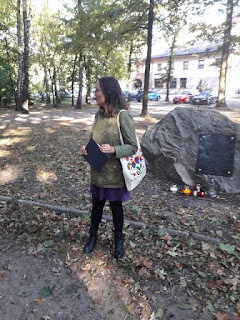Do tej pory przetłumaczyliśmy trzy książki z jidysz na polski. Były to: "Sokołów - moje zniszczone miasteczko" Pereca Granatsztejna, "W cieniu Treblinki" oraz "Dzień w Treblince" Simchy Poliakewicza. Wszystkie znajdują się za darmo na stronie sokolow.jewish.pl.
Historia Żydów z Sokołowa Podlaskiego została opisana w jeszcze jednej książce. To 750-stronicowa Księga Pamięci. Potrzebujemy pomocy, by zrealizować ten ważny projekt. Tłumaczenie tej książki również zamieścimy w Internecie. Zachęcamy Państwo do wpłat na stronie https://pomagam.pl/sokolowpodlaski
9/27/19
9/22/19
Upamiętnienie ofiar likwidacji getta
22 września 1942 r. Niemcy rozpoczęli likwidację getta w Sokołowie Podlaskim. Ponad połowa mieszkańców miasta - Żydzi, którzy przez pokolenia przyczyniali się do rozwoju Sokołowa - została wywieziona do Treblinki. Upamiętniliśmy tę tragiczną rocznicę, odczytując fragment książki Simchy Poliakewicza "Dzień w Treblince". Fragment swojego opowiadania "Droga do Treblinki", inspirowanego prawdziwymi wydarzeniami, przeczytała nauczycielka SP1, Wiesława Kwiek. Psalm 23 odczytał nauczyciel SP3, Jacek Odziemczyk.
9/20/19
Ceremony in Sokolow
I invite you on Sunday, September 22, at 3pm for the ceremony commemorating the Sokołów Jews who were killed during the war.
9/7/19
"One day at Treblinka"
The Gszarim Foundation has translated from Yiddish into Polish and published another Book of Remembrance. "One day at Treblinka" by Simche Poliakewicz is the third book on the history of the Jewish community of Sokołów Podlaski, translated by our organization with the support of the Association of the Jewish Historical Institute of Poland and private donors.
Two years ago, we prepared a translation of Perec Granatsztejn's book "Sokołów - my destroyed town", presenting memories of a bustling town in the interwar period.
Last year - "In the Shadow of Treblinka" by Simcha Poliakewicz - a book describing the time of the German occupation.
The author of "One day at Treblinka" was born in Sterdyń. During the war he was in Sokołów, from where he was sent to the Treblinka camp. He managed to escape from there and - thanks to the help of one of the local families - produced false documents with which he went to Warsaw. In his memoirs published in 1948, he describes the war reality of a small town located in the vicinity of a deadly camp machine. He speaks directly about the dangers that were lurking for Jews not only by Germans but also by Poles. He portrays both peasants who searched the property left by Jews and the family who took him under their roof. It highlights the diversity of attitudes, which only makes his testimony more authentic.
The author of the translation is Dr. Agata Reibach. The texts of all books are available at www.sokolow.jewish.pl and can be used by the town's residents, who until now, due to the language barrier, could not get to know this part of our common history.
Two years ago, we prepared a translation of Perec Granatsztejn's book "Sokołów - my destroyed town", presenting memories of a bustling town in the interwar period.
Last year - "In the Shadow of Treblinka" by Simcha Poliakewicz - a book describing the time of the German occupation.
The author of "One day at Treblinka" was born in Sterdyń. During the war he was in Sokołów, from where he was sent to the Treblinka camp. He managed to escape from there and - thanks to the help of one of the local families - produced false documents with which he went to Warsaw. In his memoirs published in 1948, he describes the war reality of a small town located in the vicinity of a deadly camp machine. He speaks directly about the dangers that were lurking for Jews not only by Germans but also by Poles. He portrays both peasants who searched the property left by Jews and the family who took him under their roof. It highlights the diversity of attitudes, which only makes his testimony more authentic.
The author of the translation is Dr. Agata Reibach. The texts of all books are available at www.sokolow.jewish.pl and can be used by the town's residents, who until now, due to the language barrier, could not get to know this part of our common history.
Subscribe to:
Comments (Atom)












